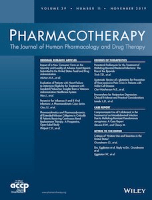
PHARMACOTHERAPY
Scope & Guideline
Empowering Insights in Therapeutic Outcomes
Introduction
Aims and Scopes
- Pharmacotherapy Optimization:
Focuses on strategies to improve medication effectiveness and minimize adverse effects, including personalized medicine approaches and pharmacokinetic/pharmacodynamic modeling. - Clinical Trials and Evidence-Based Studies:
Publishes studies evaluating the safety and efficacy of pharmacological agents through randomized controlled trials, cohort studies, and meta-analyses. - Drug Interactions and Safety Assessments:
Explores the implications of drug-drug interactions, especially in vulnerable populations such as the elderly, transplant recipients, and patients with multiple comorbidities. - Innovative Therapeutics:
Investigates emerging therapies and novel drug combinations, particularly in the context of resistant infections and chronic diseases. - Pharmacogenomics and Individualized Therapy:
Examines the role of genetic factors in drug response, promoting tailored treatment plans based on individual patient profiles. - Antimicrobial Stewardship:
Focuses on optimizing the use of antibiotics and other antimicrobials to combat resistance and improve patient outcomes. - Public Health and Policy Implications:
Addresses the broader implications of pharmacotherapy on healthcare systems, including prescribing practices, cost-effectiveness, and health outcomes.
Trending and Emerging
- Real-World Evidence and Effectiveness Studies:
There is a growing trend towards studies that assess the effectiveness of therapies in real-world settings, moving beyond controlled trial environments to better understand patient outcomes. - Integration of Pharmacogenomics into Clinical Practice:
Emerging research focuses on the incorporation of pharmacogenomic testing to personalize medication regimens and optimize therapeutic outcomes. - Management of Complex Conditions:
Increased attention is being given to the pharmacotherapy of complex conditions such as obesity, diabetes, and cardiovascular diseases, reflecting the need for multifaceted treatment approaches. - Antimicrobial Resistance and Novel Antibiotics:
As resistance to existing antibiotics grows, there is a notable increase in studies exploring new antimicrobial agents and alternative treatment strategies. - Patient Safety and Quality of Care:
Research focusing on improving patient safety, including the management of adverse drug reactions and medication errors, is becoming increasingly prevalent. - Telepharmacy and Digital Health Solutions:
The integration of technology in pharmacotherapy, including telehealth consultations and digital monitoring tools, is an emerging area of focus reflecting changes in healthcare delivery.
Declining or Waning
- Traditional Antibiotic Therapies:
Research focused on established antibiotics has seen a decline as attention shifts toward novel therapies and resistance mechanisms. - Generalized Pharmacotherapy Reviews:
The journal has moved away from broad reviews of pharmacotherapy in favor of more specific studies addressing precise drug interactions or innovative therapies. - Outdated Treatment Protocols:
Interest in older treatment protocols that lack contemporary relevance has diminished, with a focus now on evidence-based, updated guidelines. - Static Clinical Guidelines:
The publication of static or unchanging clinical guidelines has decreased, as the journal emphasizes dynamic, evidence-based recommendations that adapt to new research findings.
Similar Journals

Clinical Pharmacology in Drug Development
Elevating drug development through peer-reviewed excellence.Clinical Pharmacology in Drug Development, published by WILEY, is a distinguished journal dedicated to advancing the field of pharmaceutical science and drug development. With a strong commitment to disseminating cutting-edge research, this journal serves as a crucial platform for professionals, researchers, and students aiming to enhance their understanding of pharmacological principles and innovations in medical therapeutics. Since its inception in 2012, the journal has consistently maintained a noteworthy presence in the academic community, currently achieving a Q2 ranking in both Pharmaceutical Science and Medical Pharmacology categories as of 2023. Although the journal operates under a subscription model, it is highly regarded for its rigorous peer-reviewed publications, offering insights into drug efficacy, safety, and regulatory challenges. Positioned at the intersection of clinical practices and pharmaceutical advancements, Clinical Pharmacology in Drug Development plays an essential role in bridging the gap between scientific research and real-world application, ensuring that the latest therapeutic strategies are optimized for patient care.
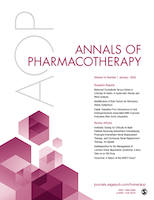
ANNALS OF PHARMACOTHERAPY
Empowering the Next Generation of PharmacotherapyANNALS OF PHARMACOTHERAPY, published by SAGE PUBLICATIONS INC, is a leading journal in the realm of pharmacology and therapeutic science, dedicated to advancing research, clinical practice, and education in the field of medicine. With a solid history dating back to its first publication in 1981, this journal offers a platform for high-quality research articles that explore the latest innovations and methodologies in pharmacotherapy. Although it operates under a subscription-based model, the journal maintains a robust academic reputation, reflected in its Scopus ranking in the 68th percentile within the category of Medicine - Pharmacology (Rank #85/272). The impact factor is continually evolving, as is the scope, which encompasses a diverse range of topics from clinical trials to the therapeutic applications of newly-developed drugs. Researchers, professionals, and students alike will find valuable insights and cutting-edge research in the ANNALS OF PHARMACOTHERAPY, making it an essential resource for anyone engaged in the field of pharmacology.
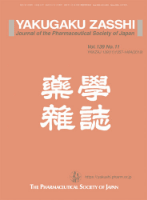
YAKUGAKU ZASSHI-JOURNAL OF THE PHARMACEUTICAL SOCIETY OF JAPAN
Innovating the future of pharmacology and toxicology.YAKUGAKU ZASSHI - JOURNAL OF THE PHARMACEUTICAL SOCIETY OF JAPAN, published by the Pharmaceutical Society of Japan, is a key academic journal dedicated to advancing the field of pharmaceutical sciences. Established in 1961 and set to contribute until 2024, this journal publishes original research articles, reviews, and clinical studies that encompass a wide spectrum of topics within pharmacology, toxicology, and pharmaceutics. Although the journal operates under a traditional subscription model, it maintains a recognized reputation with an impact factor that is steadily aligned within its category quartiles—ranking Q3 in Pharmaceutical Science and Q4 in Pharmacology as of 2023. With Scopus rankings reflecting its competitive standing, YAKUGAKU ZASSHI serves as a vital resource for researchers, professionals, and students looking to engage with innovative findings and broaden their understanding of pharmaceutical methodologies and research practices. With a current focus on bridging scientific research with real-world applications, it seeks to foster collaboration and knowledge sharing within the pharmaceutical community.

Drug Healthcare and Patient Safety
Championing safe medication practices for all.Drug Healthcare and Patient Safety is a premier Open Access journal, published by DOVE MEDICAL PRESS LTD since 2009, dedicated to advancing the understanding and practices surrounding medication safety and healthcare delivery. With its ISSN 1179-1365 and E-ISSN matching, this New Zealand-based journal not only fosters global discourse but also prioritizes the dissemination of research that intersects both health policy and pharmacology. Categorized as Q2 in Health Policy and Q3 in Pharmacology for the year 2023, it occupies a notable position within the academic community, as reflected by its Scopus rankings, which place it in the 66th and 45th percentiles of its respective categories. Drug Healthcare and Patient Safety aims to provide a platform for researchers, practitioners, and students to share innovative findings, promote safe medication practices, and explore the implications of health policy on patient outcomes. As an Open Access journal, it ensures that vital research is accessible to a wider audience, making significant contributions to the ongoing dialogue in the fields of healthcare and pharmacovigilance.
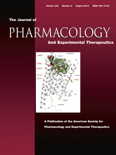
JOURNAL OF PHARMACOLOGY AND EXPERIMENTAL THERAPEUTICS
Innovating Therapeutic Strategies for a Healthier TomorrowThe JOURNAL OF PHARMACOLOGY AND EXPERIMENTAL THERAPEUTICS, published by the American Society for Pharmacology and Experimental Therapeutics, stands as a pivotal platform in the fields of pharmacology and molecular medicine. With an impressive convergence of knowledge from 1945 to 2024, this esteemed journal is recognized for its rigorous peer-reviewed research, contributing significantly to our understanding of drug action and therapeutic interventions. It holds a commendable position in the Q2 quartile in both Molecular Medicine and Pharmacology, emphasizing its relevance and impact within the contemporary scientific landscape, as evidenced by its Scopus ranking that places it amongst the leading journals in its category. Aimed at researchers, professionals, and students, the journal not only fosters a deeper insight into toxicology, pharmacodynamics, and therapeutic strategies but also encourages innovation through its comprehensive access to groundbreaking experimental methodologies. The journal continues to foster discourse and disseminate research that shapes the future of pharmacological science.
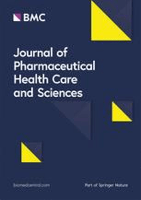
Journal of Pharmaceutical Health Care and Sciences
Empowering healthcare through cutting-edge pharmaceutical research.The Journal of Pharmaceutical Health Care and Sciences is a premier open access journal published by BMC that aims to advance the field of pharmaceutical sciences by providing high-quality research and comprehensive reviews across various domains including pharmacology, nursing, and healthcare. With an impact factor reflecting its relevance and rigor, the journal has established itself as a significant platform for disseminating knowledge since its inception in 2015. The journal is indexed in Scopus, currently holding a position in the Q3 quartile for medical pharmacology and Q2 quartile for nursing pharmacology, indicating its growing influence and reach in the scientific community. Based in the United Kingdom with a commitment to open access, the Journal of Pharmaceutical Health Care and Sciences ensures that all researchers, professionals, and students have free access to vital research that fosters innovation and improves healthcare outcomes worldwide. With a focus on collaborative and multidisciplinary approaches, the journal invites contributions that align with its objectives of enhancing health care delivery and pharmaceutical practices.

Journal of Pharmacology & Pharmacotherapeutics
Empowering Researchers with Cutting-Edge Pharmacological KnowledgeJournal of Pharmacology & Pharmacotherapeutics is a vital academic resource published by SAGE Publications Inc., focusing on the diverse and evolving fields of pharmacology and pharmacotherapy. With an ISSN of 0976-500X and E-ISSN 0976-5018, this journal serves as a platform for rigorous research and innovative insights from 2010 to 2024, reflecting the latest advancements and challenges within the pharmacological landscape. Despite being placed in the Q4 quartile for both general pharmacology and medical pharmacology in 2023, it continues to be an essential resource for researchers, professionals, and students striving to understand the complexities of drug action, therapy optimization, and pharmaceutical sciences. The journal underscores the importance of disseminating critical findings to stimulate further research and collaborative dialogue. Although currently not open access, it can be accessed through leading academic databases, positioning itself as a significant entity in the medical and pharmacological research community.
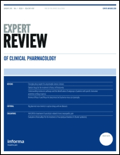
Expert Review of Clinical Pharmacology
Exploring the frontiers of pharmacology for enhanced clinical practice.Expert Review of Clinical Pharmacology, published by TAYLOR & FRANCIS LTD, is a leading peer-reviewed journal dedicated to the field of clinical pharmacology, with a strong focus on the development and application of pharmacological therapies in patient care. Boasting an impressive impact, the journal ranks in the first quartile across multiple categories including Medicine (miscellaneous), Pharmacology (medical), and Pharmacology, Toxicology and Pharmaceutics (miscellaneous), reflecting its influential position within the scientific community. With a Scopus ranking of #6 in General Pharmacology, Toxicology and Pharmaceutics, the journal also achieves a commendable 93rd percentile, further emphasizing its importance as a resource for researchers and clinicians alike. As it continues to publish innovative reviews and research articles from 2008 until 2024, the Expert Review of Clinical Pharmacology plays an essential role in advancing knowledge, improving clinical practice, and fostering collaboration among experts in pharmacology, thereby driving forward the field's evolution towards better patient outcomes.
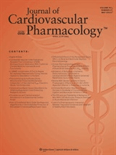
JOURNAL OF CARDIOVASCULAR PHARMACOLOGY
Advancing cardiovascular health through innovative pharmacology.JOURNAL OF CARDIOVASCULAR PHARMACOLOGY, published by LIPPINCOTT WILLIAMS & WILKINS, is a leading peer-reviewed journal dedicated to the exploration and advancement of pharmacological therapies related to cardiovascular diseases. With its ISSN 0160-2446 and E-ISSN 1533-4023, this esteemed journal has been at the forefront of cardiovascular research since its inception in 1979, continuously offering insights until 2024. It holds a commendable position in the 2023 category quartiles, classified as Q2 in both Cardiology and Cardiovascular Medicine, as well as Medicine (miscellaneous) and Pharmacology, showcasing its significance within these fields. The journal presents a unique platform for researchers, health professionals, and students to disseminate their findings, fostering an environment of knowledge growth and collaboration in cardiovascular pharmacology. Readers can expect to find high-quality articles that contribute to the body of knowledge in cardiovascular therapies, ensuring they remain informed of the latest advancements and clinical practices. Discover more about this influential publication and its commitment to enhancing cardiovascular health.
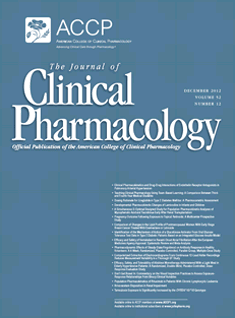
JOURNAL OF CLINICAL PHARMACOLOGY
Unveiling the Future of Drug Safety and EfficacyWelcome to the Journal of Clinical Pharmacology, an esteemed publication in the field of pharmacology and medical pharmacology, published by Wiley. Since its inception in 1973, this journal has been at the forefront of disseminating innovative research findings and comprehensive reviews that enhance our understanding of drug therapies and their clinical applications. With an impact factor that reflects its strong reputation and a Scopus ranking placing it in the 64th percentile among 272 journals in medical pharmacology, the journal stands as a critical resource for researchers, healthcare professionals, and students alike. Although currently not an Open Access journal, it provides invaluable insights into therapeutic drug use and safety, the pharmacokinetics of drugs, and the development of new therapeutic strategies. The journal's commitment to advancing the field through high-quality, peer-reviewed articles ensures it remains a vital asset in the continuously evolving landscape of clinical pharmacology.